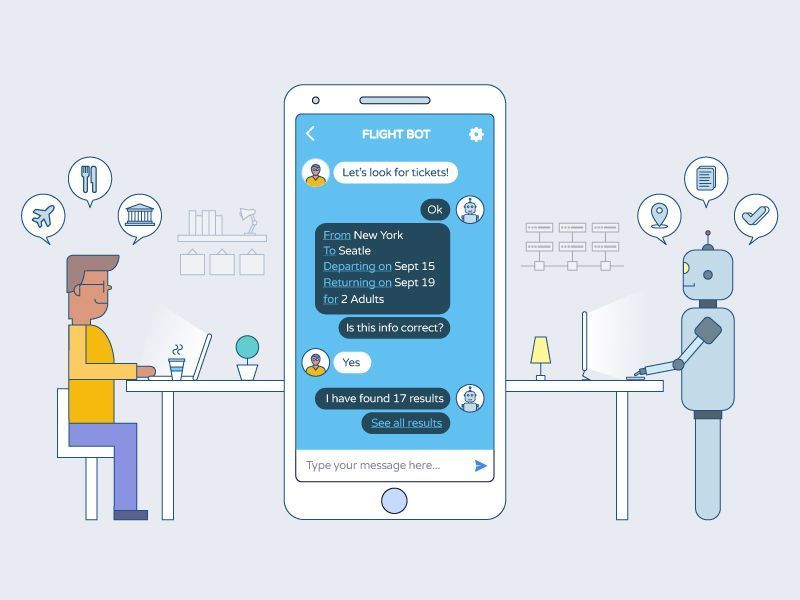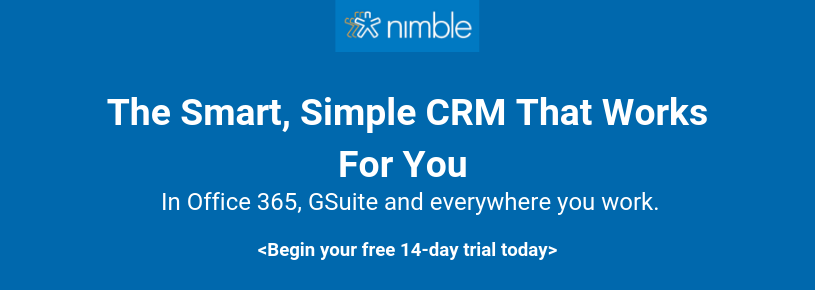We hear a lot about marketing automation in passing, but the details of how automation will benefit marketers now and in the future are often left unspecified.
Here are six marketing automation trends you can expect to see in the near future:
Chatbots Will Become Essential in Marketing Automation — Not Just Optional
Chatbots are certainly gaining ground in marketing automation, but many marketers still consider them a nice-to-have and not essential. That will likely change soon; you’ll notice a shift happening where the brands that don’t have chatbots encounter significant engagement difficulties compared to those using them.
“Marketing automation is still in a nascent stage,” says digital marketing consultant Shane Barker, “but will be a major trend in the future. Marketers are realizing the benefits of automation and its applications in the field of marketing. The use of machine learning, AI, personalization, and chatbots will be the biggest marketing automation trends in the future.”
Chatbots assist with many parts of a company’s marketing plans, whether by nurturing leads or answering questions people ask outside of business hours. And research shows customers prefer chatting if asked how they like to communicate with brands.

If you haven’t started using chatbots yet, now is the time to think seriously about making a change. Think beyond the initial investment costs and realize that chatbots could help your company save time and money while keeping customers happy and loyal.
More Job Ads Will Require Marketing Automation Skills From Applicants
As a growing number of companies increase their reliance on marketing automation, you’ll likely see more job postings listing marketing automation as an essential skill.
“I believe that if you’re going to enter the marketing career in the next few years, you will need to have a good understanding of marketing automation,” says Michal Leszczynski, Content Marketing Manager for GetResponse.
Leszcyzynski says he believes this for three reasons:
“First is that the consumer journey doesn’t just take place on one channel. Your customers expect to pause and pick up the conversation they had with your brand no matter where or when they started it.
“The second one is that you hardly ever run marketing campaigns using a single channel these days.
Whether you’re using chatbots, emails, or social media – all these elements should reinforce each other and carry the same message.
“Lastly, the tools that offer marketing automation capabilities have become much more affordable. They are usually within reach of even smaller SMBs.”
A recently published poll from CleverTouch Marketing surveyed people around the world about things related to marketing automation. It showed that a skills shortage causes challenges for those wishing to implement it.
The study found that nearly half (48%) of marketing companies recruit specialized talent to assist with meeting their marketing automation aims. Moreover, only 13% of enterprises keep all of their marketing automation in-house, with the rest relying on outside parties such as consultants to fill the gap. Additionally, 40% admitted that a lack of talent and skills is the biggest challenge they face when implementing their marketing automation strategies.
All these things strongly point to a noticeable uptick in job advertisements that require candidates to have marketing automation know-how. Similarly, if marketers want to set themselves apart and anticipate looking for new opportunities soon, they should start looking at ways to grow their knowledge to remain competitive.
Generic Content Will Become Almost Non-Existent As Marketers Strive to Appeal to Customers
Marketing automation software assists companies with relevant content creation by making it easier for them to deliver the appropriate material to keep customers interested during each part of the engagement and purchasing cycles. Marketing will become even more customer-centric in the coming months and years, and people expect companies to give them personalized content.

That means if businesses primarily distribute generic content, they’ll find that it falls short. Customers that continually see non-personalized content will become fed up and bored, soon deciding it’s best to look elsewhere and do business with enterprises that are more in tune with the precise needs of their audiences. Fortunately, marketing automation helps companies cater to customers’ expectations.
Marketers Must Stay Current With Email Automation to See Sufficient ROIs
Despite many marketing professionals realizing that automation is the way forward, many lack advanced skills they could use to boost their return on investment (ROI). That’s the conclusion made by the Email Marketing & Marketing Automation Excellence 2018 report, a joint effort by Smart Insights and GetResponse.
Only 5% of the marketers polled considered themselves experts in email automation, and most people in the overall pool of respondents admitted they only use a few features of their marketing automation suites, stick to their offerings associated with core functionality, or want to increase their knowledge of the available tools within their systems.
However, on a positive note, 47% of the respondents expected to increase their marketing budgets, and 33% anticipated the budget would stay the same. That suggests many marketers should have the financial resources they need to either learn about existing email automation tools or invest in new ones.
Email automation is but one facet of marketing automation, but it’s a crucial one. After all, email is such a widely used communication method, and it gives companies clear links to the consumers they want to reach.
One way that you could boost ROI for your email automation efforts is to use messages that automatically arrive once customers do certain things. For example, they might come to an inbox once a person finishes a tech support phone call, submits a form or leaves items in their shopping carts without following through with a purchase.
Marketing Professionals Will Have More Opportunities to Connect CRM Software to Other Tools
Analysts expect an increasing push from marketing companies to develop and offer products enabling customers to integrate the other software they already use. This progress highlights the ongoing consolidation and integration of technology. Marketing professionals like the idea of accomplishing things without switching between numerous separate interfaces, especially when using a customer relationship management (CRM) product.
Many leading CRM providers aim to make things as streamlined as possible for their current and potential customers. For example, Nimble is a CRM tool that integrates with Office 365 and G Suite, simplifying the process of building lead lists and keeping tabs on contacts without continually moving between inboxes and the CRM.
It’s highly likely that the most successful CRM brands will continue to attract new customers while keeping existing ones happy as they explore ways to make workflows more efficient. When CRM brands continually look for ways to increase their integration capabilities and call out those features while advertising their offerings, they’ll remain profitable this year and for the foreseeable future.
Predictive Lead Scoring Will Become More Prominent in Marketing Automation
You may have already noticed marketers relying on predictive lead scoring more frequently than in the past. That’s because traditional lead scoring often spotlights the people who are not likely to convert instead of boosting conversion rates by targeting the most qualified leads. In contrast, predictive lead scoring is a conversion rate booster.
It digs into gigantic quantities of data and finds trends that marketers would miss without help. Then, the lead scores assigned to each person in the marketing pipeline allow those professionals to figure out which individuals need most of their attention, and make such decisions authoritatively.
As marketing automation gets more advanced, you’ll see more companies using predictive lead scoring in their respective platforms. They’ll realize that altering their methods like this allows them to get more favorable outcomes more often.
An Evolving Technology
This list gives you a thorough overview of why there’s so much to be excited about concerning marketing automation.
Regardless of whether you use marketing automation daily now or haven’t begun incorporating it into your strategies at all yet, these trends can serve as guideposts as you map out action plans to help your company prosper.


